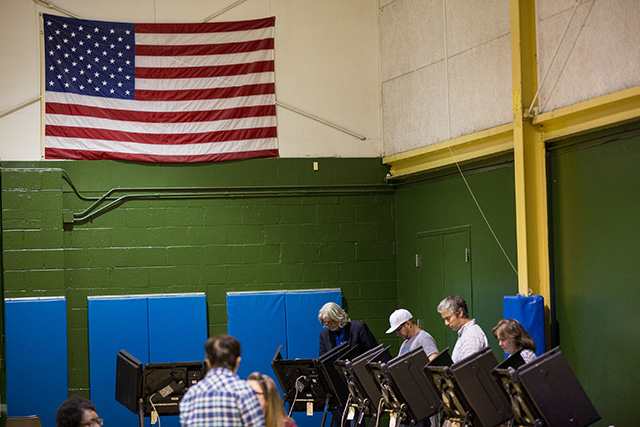
Did you know that Truthout is a nonprofit and independently funded by readers like you? If you value what we do, please support our work with a donation.
In a ruling hailed as a major and historic “victory for democracy,” a federal court on Tuesday deemed North Carolina’s 2016 congressional map unconstitutional on the grounds that it was drawn to discriminate against Democratic voters — marking the first time a federal court has struck down a redistricting plan for partisan gerrymandering.
“Every American deserves representation in Washington, but the gerrymandered map struck down by the court today robbed much of the state of a representative voice in the nation’s capital,” said Karen Hobert Flynn, president of Common Cause, one of the advocacy groups the legal challenge against North Carolina’s Republican Party. “Partisan gerrymanders are quite simply undemocratic.”
The three-judge panel’s decision (pdf) on Tuesday may have been unique in its stand against extreme partisan redistricting, but it was not the first time North Carolina’s Republican-drawn congressional map has been struck down for violating the constitutional rights of voters. As Prema Levy of Mother Jones points out, “the state’s previous map was deemed illegal for being racially gerrymandered in 2016” — years after the map allowed the GOP to take a vast majority of the state’s House seats.
Following the 2016 ruling, North Carolina Republicans explicitly looked to structure the state’s congressional map to give themselves a “partisan advantage” — resulting in what the Brennan Center for Justice called “one of the worst partisan gerrymanders of the decade.”
North Carolina voters have scored a big victory against one of the worst partisan gerrymanders of the decade. https://t.co/Xl3uhCRbBY
— Brennan Center (@BrennanCenter) January 10, 2018
“I acknowledge freely that this would be a political gerrymander, which is not against the law,” Rep. David Lewis (R-N.C.), chairman of the state House’s Redistricting Committee, declared during a 2016 meeting. “I think electing Republicans is better than electing Democrats. So I drew this map to help foster what I think is better for the country.”
The North Carolina district court’s determination on Tuesday that extreme partisan gerrymandering is, in fact, unconstitutional — violating the Equal Protection Clause, the First Amendment, and the Election Clause of Article I of the Constitution — is likely to gain national significance in the coming months, as the Supreme Court is currently considering two similar partisan gerrymandering cases in Wisconsin and Maryland.
This decision is so thorough. It tells the story of how unfettered partisan gerrymandering hijacked democracy in North Carolina. The decision is long but worth the read. https://t.co/H0RfzOAdcw https://t.co/ZidOKzAwFa
— Sherrilyn Ifill (@Sifill_LDF) January 10, 2018
North Carolina Republicans are expected to appeal to the Supreme Court to put the ruling on hold until the other two cases are decided — a delay that would allow the current map to remain in place through the 2018 midterm elections.
J. Michael Bitzer, professor of political science at Catawba College, told the New York Timesthat if Tuesday’s ruling is upheld, it “gives hope to Democrats” looking to wrest control of the state’s legislature from the GOP.
“I can imagine the Republicans being furious, but they have to see political reality, and it’s not just in the next two weeks: It’s come November,” Bitzer concluded.
Media that fights fascism
Truthout is funded almost entirely by readers — that’s why we can speak truth to power and cut against the mainstream narrative. But independent journalists at Truthout face mounting political repression under Trump.
We rely on your support to survive McCarthyist censorship. Please make a tax-deductible one-time or monthly donation.